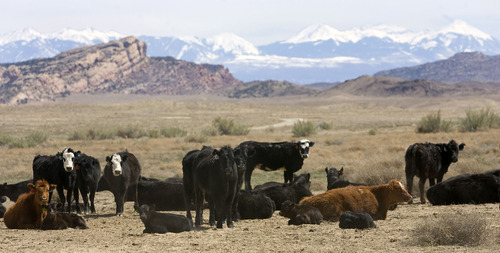This is an archived article that was published on sltrib.com in 2012, and information in the article may be outdated. It is provided only for personal research purposes and may not be reprinted.
The Utah Humane Society and other advocacy groups oppose a bill that would make it a crime to videotape or photograph agricultural operations without permission from owners, saying the legislation would have a chilling effect on stopping animal abuse and trample free-speech rights.
HB187, which passed the House on a 60-to-14 vote last week, is before the Senate.
Rep. John Mathis, R-Vernal, said his bill is intended to stop groups such as People for the Ethical Treatment of Animals from taking what he described as distorted videos alleging animal abuse.
PETA spokesman Jeremy Beckham said photographs and videotapes "often are the best tools we can give to law enforcement" in uncovering animal abuses in factory farms. He said several covert operations in other states have led to criminal charges.
"The Utah bill would help protect abusers," he said.
Gene Baierschmidt, executive director of the Utah Humane Society, said the bill would discourage "individuals from obtaining the documentation required by government officials and law enforcement authorities to address possible animal cruelty cases.
"If an individual steps on someone else's property and takes a picture of a horse that appears to be starving, and then provides that photograph to the authorities, that person would be in violation of this proposed law," Baierschmidt said in a statement.
The Utah Farm Bureau supports the bill.
Sterling Brown, vice president of public policy, said the measure addresses concerns that individuals and groups are coming onto farms "with the intent of harming the animal industry."
"We want to bring that to a close," said Brown. "Or at least to bring some penalties to these types of actions."
Mathis, a veterinarian, has amended the bill in hopes of capturing more supporters, lowering penalties from felony charges for repeated offenses to a misdemeanor.
Still, the bill is so flawed that someone taking photographs on public lands could be found in violation, said Mickey Osterreicher, attorney for the National Press Photographers Association.
Specifically, the bill defines an agricultural operation as "property used for the production of livestock, poultry, livestock products, or poultry products." Given that wording, violations could occur not only on private property, but on public lands or lands that are both public and private — as long as there is some type of agricultural enterprise, the attorney said.
"The Utah bill has penalties that extend beyond private property — onto public lands. This goes against what public lands are all about."
Although no state has passed laws criminalizing photographing or videotaping farm animals, similar bans are being debated in Iowa, Minnesota, New York, Nebraska, Florida and Indiana. Osterreicher said the bans go against First Amendment rights that protect photography and recordings.
"We recognize that if someone goes onto private property without permission, there are already liabilities for trespassing," he said. "But we are concerned about criminalizing specific First Amendment protections."
Humane Society spokesman Carl Arky said the bill also is discriminatory, by providing "special protections" for farms that no other industry enjoys.
For instance, individuals taking pictures of potential violations in hospitals, drug production facilities, manufacturing plants, food preparation operations, restaurants or car repair shops do not face similar penalties, she said.
Twitter@DawnHouseTrib —
HB187 would:
• Prohibit recording images or sounds of livestock or poultry farms without owners' permission.
• Prohibit leaving unauthorized recording devices on agricultural operations.
• Make violations class A or class B misdemeanors, with up to a year or six months in jail, respectively.



